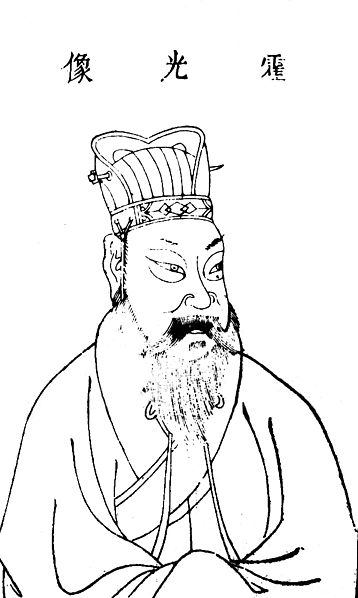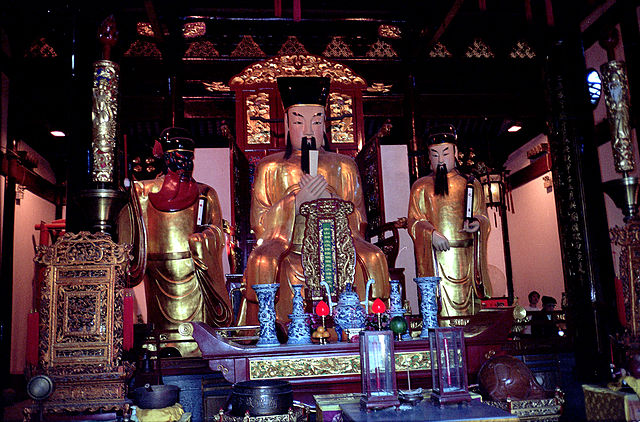Huo Guang, courtesy name Zimeng (子孟), was a Chinese military general and politician who served as the dominant state official of the Western Han dynasty from 87 BCE until his death in April 68 BCE. The younger half-brother of the renowned general Huo Qubing, Huo was a palace aide to Emperor Wu and secured power in his own right at the emperor's death, when he became principal co-regent for Emperor Zhao. Huo outmaneuvered his colleagues in the regency and assumed personal control over state affairs, consolidating his power by installing family members and other loyalists in key offices. Following Emperor Zhao's death in June 74 BCE, Huo engineered the succession and deposition of Liu He within a mere 27 days. Huo next facilitated the accession of Emperor Xuan and retained control of the Han government until his death.
Portrait of Huo Guang in Sancai Tuhui
Huo Guang at the center of an altar in Shanghai City God Temple
The Han dynasty was an imperial dynasty of China, established by Liu Bang and ruled by the House of Liu. The dynasty was preceded by the short-lived Qin dynasty (221–206 BC) and a warring interregnum known as the Chu–Han contention (206–202 BC), and it was succeeded by the Three Kingdoms period (220–280 AD). The dynasty was briefly interrupted by the Xin dynasty (9–23 AD) established by the usurping regent Wang Mang, and is thus separated into two periods—the Western Han and the Eastern Han (25–220 AD). Spanning over four centuries, the Han dynasty is considered a golden age in Chinese history, and had a permanent impact on Chinese identity in later periods. The majority ethnic group of modern China refer to themselves as the "Han people" or "Han Chinese". The spoken Sinitic language and written Chinese are referred to respectively as the "Han language" and "Han characters".
Western Han painted ceramic jar with raised reliefs of dragons, phoenixes, and taotie
Reverse side of a Western Han bronze mirror with a painted flower motif
Statue of a horse trampling a Xiongnu warrior, at the mausoleum of Western Han general Huo Qubing (d. 117 BC), who fought in the Han–Xiongnu War. This is the first known monumental stone statue in China.
The ruins of a Han-dynasty watchtower made of rammed earth at Dunhuang, located at the eastern edge of the Silk Road






